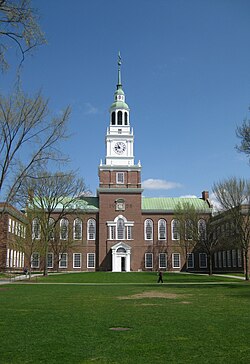 Old division game played on the Green at Dartmouth College in 1874 | |
| First played | 1820s |
|---|---|
| Characteristics | |
| Contact | Yes |
| Team members | Dartmouth College |
| Type | Medieval football |
| Equipment | Football ball |
| Venue | The Green (Dartmouth) |
| Presence | |
| Country or region | United States |
| Olympic | No |
| World Championships | No |
| Paralympic | No |
| Part of the American football series on the |
| History of American football |
|---|
| Origins of American football |
| Close relations to other codes |
| Topics |
Old division football was a mob football game played from the 1820s to around 1890 by students at Dartmouth College in Hanover, New Hampshire, U.S.
The game was first played before the rules for association football and rugby football were standardized in England, and it continued to rely on its own local rules for some time after students learned of the newer imports. Dartmouth students published the rules of what is now called old division football in 1871.
The game involved unlimited sides made up variously of the members of the two literary societies on campus: the United Fraternity versus the Social Friends ("Fraters v. Socials"); the even-numbered class years versus the odd-numbered years ("Old Division" or "Whole Division") and sometimes "New Hampshire v. the World". Every year a special match sometimes called the Usual Game of Foot Ball occurred early in the fall in which the sophomores took on the freshmen. The game was more about bragging rights, and by the late nineteenth century involved little more than a mob fight over possession of the round ball. The event became known as the 'Usual Football Rush' and then simply the 'Football Rush', lasting until 1948.

